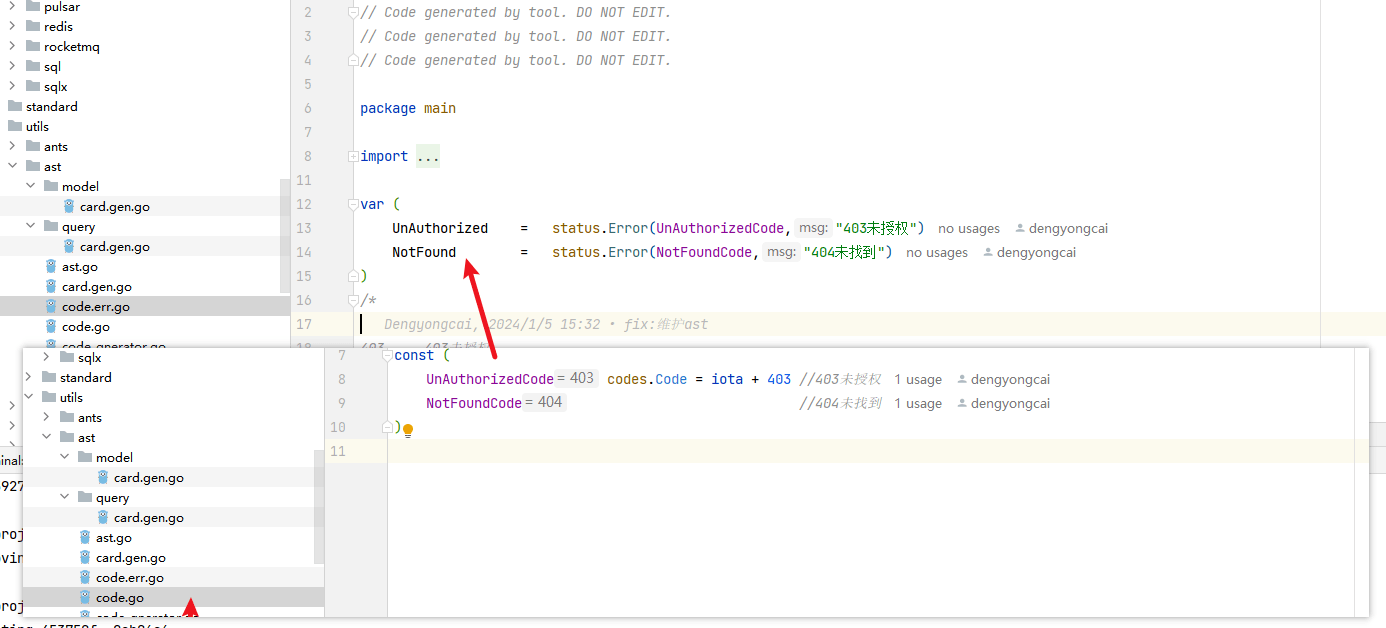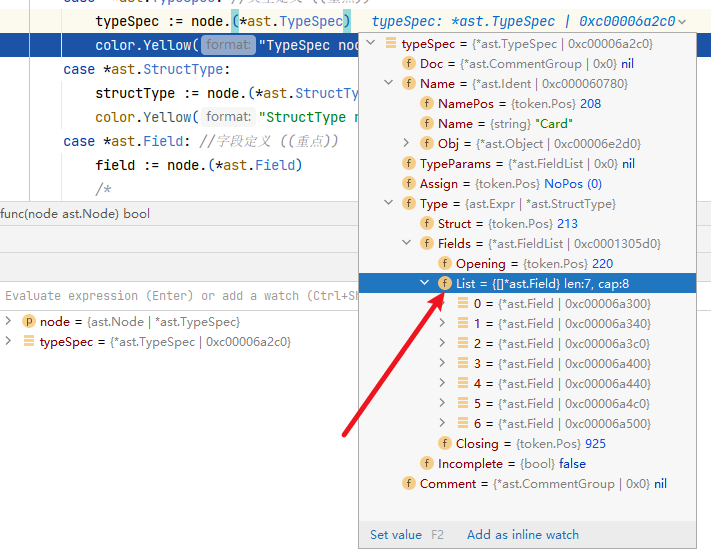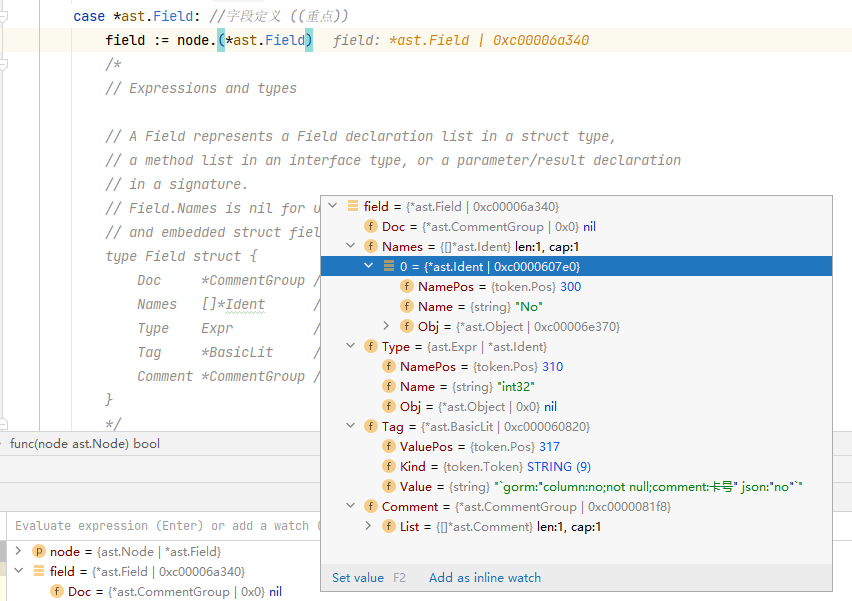

ast语法树 - Go语言中文网 - Golang中文社区
source link: https://studygolang.com/articles/36471
Go to the source link to view the article. You can view the picture content, updated content and better typesetting reading experience. If the link is broken, please click the button below to view the snapshot at that time.
AST语法树
refer
https://juejin.cn/post/6844903982683389960#heading-2
本文的代码地址
https://github.com/luxun9527/go-lib/tree/master/utils/ast 您的star就是我更新的动力
go文件,可以视为一颗由方法,包,字段,变量,注释组成的语法树,可以使用go提供的api,可以获取go文件中的方法,包,字段,变量,注释等信息,
当你有需求要根据一段go代码生成一段新的go代码、文档或有时候使用一些工具(protobuf,gorm gen生成model)生成的代码无法满足我们的需求的时候。
根据错误码生成对应的错误定定义

将gen生成的代码,加上我们自己定义的方法。

给protobuf生成的文件注入我们自己的tag protoc-go-inject-tag
api介绍
在go提供的api中所有的,包,字段,变量,注释等元素视为node,主要是三种,Expressions and type nodes, statement nodes, and declaration nodes.
// There are 3 main classes of nodes: Expressions and type nodes,
// statement nodes, and declaration nodes. The node names usually
// match the corresponding Go spec production names to which they
// correspond. The node fields correspond to the individual parts
// of the respective productions.
//
// All nodes contain position information marking the beginning of
// the corresponding source text segment; it is accessible via the
// Pos accessor method. Nodes may contain additional position info
// for language constructs where comments may be found between parts
// of the construct (typically any larger, parenthesized subpart).
// That position information is needed to properly position comments
// when printing the construct.
// All node types implement the Node interface.
type Node interface {
Pos() token.Pos // position of first character belonging to the node
End() token.Pos // position of first character immediately after the node
}
// All expression nodes implement the Expr interface.
type Expr interface {
Node
exprNode()
}
// All statement nodes implement the Stmt interface.
type Stmt interface {
Node
stmtNode()
}
// All declaration nodes implement the Decl interface.
type Decl interface {
Node
declNode()
}
1 Expression and Type
标识符和类型。
标识符:变量名,函数名,包名,类型名等。
// An Ident node represents an identifier.
Ident struct {
NamePos token.Pos // identifier position
Name string // identifier name
Obj *Object // denoted object; or nil
}
类型:结构体类型,interface类型,方法类型等。
// A type is represented by a tree consisting of one
// or more of the following type-specific expression
// nodes.
type (
// An ArrayType node represents an array or slice type.
ArrayType struct {
Lbrack token.Pos // position of "["
Len Expr // Ellipsis node for [...]T array types, nil for slice types
Elt Expr // element type
}
// A StructType node represents a struct type.
StructType struct {
Struct token.Pos // position of "struct" keyword
Fields *FieldList // list of field declarations
Incomplete bool // true if (source) fields are missing in the Fields list
}
// Pointer types are represented via StarExpr nodes.
// A FuncType node represents a function type.
FuncType struct {
Func token.Pos // position of "func" keyword (token.NoPos if there is no "func")
TypeParams *FieldList // type parameters; or nil
Params *FieldList // (incoming) parameters; non-nil
Results *FieldList // (outgoing) results; or nil
}
// An InterfaceType node represents an interface type.
InterfaceType struct {
Interface token.Pos // position of "interface" keyword
Methods *FieldList // list of embedded interfaces, methods, or types
Incomplete bool // true if (source) methods or types are missing in the Methods list
}
// A MapType node represents a map type.
MapType struct {
Map token.Pos // position of "map" keyword
Key Expr
Value Expr
}
// A ChanType node represents a channel type.
ChanType struct {
Begin token.Pos // position of "chan" keyword or "<-" (whichever comes first)
Arrow token.Pos // position of "<-" (token.NoPos if there is no "<-")
Dir ChanDir // channel direction
Value Expr // value type
}
)
2 Statement
赋值语句,控制语句(if,else,for,select...)等均属于statement node。
// A statement is represented by a tree consisting of one
// or more of the following concrete statement nodes.
type (
// A BadStmt node is a placeholder for statements containing
// syntax errors for which no correct statement nodes can be
// created.
//
BadStmt struct {
From, To token.Pos // position range of bad statement
}
// A DeclStmt node represents a declaration in a statement list.
DeclStmt struct {
Decl Decl // *GenDecl with CONST, TYPE, or VAR token
}
// An EmptyStmt node represents an empty statement.
// The "position" of the empty statement is the position
// of the immediately following (explicit or implicit) semicolon.
//
EmptyStmt struct {
Semicolon token.Pos // position of following ";"
Implicit bool // if set, ";" was omitted in the source
}
// A LabeledStmt node represents a labeled statement.
LabeledStmt struct {
Label *Ident
Colon token.Pos // position of ":"
Stmt Stmt
}
// An ExprStmt node represents a (stand-alone) expression
// in a statement list.
//
ExprStmt struct {
X Expr // expression
}
// A SendStmt node represents a send statement.
SendStmt struct {
Chan Expr
Arrow token.Pos // position of "<-"
Value Expr
}
// An IncDecStmt node represents an increment or decrement statement.
IncDecStmt struct {
X Expr
TokPos token.Pos // position of Tok
Tok token.Token // INC or DEC
}
// An AssignStmt node represents an assignment or
// a short variable declaration.
//
AssignStmt struct {
Lhs []Expr
TokPos token.Pos // position of Tok
Tok token.Token // assignment token, DEFINE
Rhs []Expr
}
// A GoStmt node represents a go statement.
GoStmt struct {
Go token.Pos // position of "go" keyword
Call *CallExpr
}
// A DeferStmt node represents a defer statement.
DeferStmt struct {
Defer token.Pos // position of "defer" keyword
Call *CallExpr
}
// A ReturnStmt node represents a return statement.
ReturnStmt struct {
Return token.Pos // position of "return" keyword
Results []Expr // result expressions; or nil
}
// A BranchStmt node represents a break, continue, goto,
// or fallthrough statement.
//
BranchStmt struct {
TokPos token.Pos // position of Tok
Tok token.Token // keyword token (BREAK, CONTINUE, GOTO, FALLTHROUGH)
Label *Ident // label name; or nil
}
// A BlockStmt node represents a braced statement list.
BlockStmt struct {
Lbrace token.Pos // position of "{"
List []Stmt
Rbrace token.Pos // position of "}", if any (may be absent due to syntax error)
}
// An IfStmt node represents an if statement.
IfStmt struct {
If token.Pos // position of "if" keyword
Init Stmt // initialization statement; or nil
Cond Expr // condition
Body *BlockStmt
Else Stmt // else branch; or nil
}
// A CaseClause represents a case of an expression or type switch statement.
CaseClause struct {
Case token.Pos // position of "case" or "default" keyword
List []Expr // list of expressions or types; nil means default case
Colon token.Pos // position of ":"
Body []Stmt // statement list; or nil
}
// A SwitchStmt node represents an expression switch statement.
SwitchStmt struct {
Switch token.Pos // position of "switch" keyword
Init Stmt // initialization statement; or nil
Tag Expr // tag expression; or nil
Body *BlockStmt // CaseClauses only
}
// A TypeSwitchStmt node represents a type switch statement.
TypeSwitchStmt struct {
Switch token.Pos // position of "switch" keyword
Init Stmt // initialization statement; or nil
Assign Stmt // x := y.(type) or y.(type)
Body *BlockStmt // CaseClauses only
}
// A CommClause node represents a case of a select statement.
CommClause struct {
Case token.Pos // position of "case" or "default" keyword
Comm Stmt // send or receive statement; nil means default case
Colon token.Pos // position of ":"
Body []Stmt // statement list; or nil
}
// A SelectStmt node represents a select statement.
SelectStmt struct {
Select token.Pos // position of "select" keyword
Body *BlockStmt // CommClauses only
}
// A ForStmt represents a for statement.
ForStmt struct {
For token.Pos // position of "for" keyword
Init Stmt // initialization statement; or nil
Cond Expr // condition; or nil
Post Stmt // post iteration statement; or nil
Body *BlockStmt
}
// A RangeStmt represents a for statement with a range clause.
RangeStmt struct {
For token.Pos // position of "for" keyword
Key, Value Expr // Key, Value may be nil
TokPos token.Pos // position of Tok; invalid if Key == nil
Tok token.Token // ILLEGAL if Key == nil, ASSIGN, DEFINE
Range token.Pos // position of "range" keyword
X Expr // value to range over
Body *BlockStmt
}
)
3 Spec Node
Spec节点表示单个(非括号括起的)导入、常量、类型或变量声明。
Spec node只有3种,分别是ImportSpec,ValueSpec和TypeSpec:
ImportSpec表示一个单独的import,ValueSpec一个常量或变量的声明,TypeSpec 则表示一个type声明。
/ ----------------------------------------------------------------------------
// Declarations
// A Spec node represents a single (non-parenthesized) import,
// constant, type, or variable declaration.
type (
// The Spec type stands for any of *ImportSpec, *ValueSpec, and *TypeSpec.
Spec interface {
Node
specNode()
}
// An ImportSpec node represents a single package import.
ImportSpec struct {
Doc *CommentGroup // associated documentation; or nil
Name *Ident // local package name (including "."); or nil
Path *BasicLit // import path
Comment *CommentGroup // line comments; or nil
EndPos token.Pos // end of spec (overrides Path.Pos if nonzero)
}
// A ValueSpec node represents a constant or variable declaration
// (ConstSpec or VarSpec production).
//
ValueSpec struct {
Doc *CommentGroup // associated documentation; or nil
Names []*Ident // value names (len(Names) > 0)
Type Expr // value type; or nil
Values []Expr // initial values; or nil
Comment *CommentGroup // line comments; or nil
}
// A TypeSpec node represents a type declaration (TypeSpec production).
TypeSpec struct {
Doc *CommentGroup // associated documentation; or nil
Name *Ident // type name
TypeParams *FieldList // type parameters; or nil
Assign token.Pos // position of '=', if any
Type Expr // *Ident, *ParenExpr, *SelectorExpr, *StarExpr, or any of the *XxxTypes
Comment *CommentGroup // line comments; or nil
}
)
4 others
// Comment 注释节点,代表单行的 //-格式 或 /*-格式的注释.
type Comment struct {
...
}
...
// CommentGroup 注释块节点,包含多个连续的Comment
type CommentGroup struct {
...
}
// Field 字段节点, 可以代表结构体定义中的字段,接口定义中的方法列表,函数前面中的入参和返回值字段
type Field struct {
...
}
...
// FieldList 包含多个Field
type FieldList struct {
...
}
// File 表示一个文件节点
type File struct {
...
}
// Package 表示一个包节点
type Package struct {
...
}
我们常用的node,一般是有一些比较基础的类型组成的这go中,ast.File,ast.ValueSpec: , ast.TypeSpec ,ast.Field 类型都是由一些基础类型组成,比如TypeSpec 类型下 会doc(CommentGroup) 和filed(FieldList) 字段。ValueSpec 类型下有 ident,doc类型的字段, 具体使用还是要debug 去看 分析这个node下有什么字段。
// A TypeSpec node represents a type declaration (TypeSpec production).
TypeSpec struct {
Doc *CommentGroup // associated documentation; or nil
Name *Ident // type name
TypeParams *FieldList // type parameters; or nil
Assign token.Pos // position of '=', if any
Type Expr // *Ident, *ParenExpr, *SelectorExpr, *StarExpr, or any of the *XxxTypes
Comment *CommentGroup // line comments; or nil
}
ValueSpec struct {
Doc *CommentGroup // associated documentation; or nil
Names []*Ident // value names (len(Names) > 0)
Type Expr // value type; or nil
Values []Expr // initial values; or nil
Comment *CommentGroup // line comments; or nil
}


遍历语法树
package main
import (
"github.com/fatih/color"
"github.com/pkg/errors"
"go/ast"
"go/parser"
"go/token"
"path/filepath"
)
// 遍历节点
func main() {
fileFullPath, err := filepath.Abs("utils\\ast\\card.gen.go")
if err!=nil{
panic(errors.WithMessage(err,"获取文件路径失败"))
}
fset := token.NewFileSet()
f, err := parser.ParseFile(fset, fileFullPath, nil, parser.ParseComments)
if err != nil {
panic(err)
}
ast.Inspect(f, func(n ast.Node) bool {
switch node := n.(type) {
case *ast.GenDecl:
color.Red("GenDecl node %+v",node)
case *ast.TypeSpec: //类型定义 ((重点)) 当我们要解析一个结构体用到
color.Yellow("TypeSpec node %+v",node)
case *ast.StructType:
color.Yellow("StructType node %+v", node)
case *ast.Field:
/*
// Expressions and types
// A Field represents a Field declaration list in a struct type,
// a method list in an interface type, or a parameter/result declaration
// in a signature.
// Field.Names is nil for unnamed parameters (parameter lists which only contain types)
// and embedded struct fields. In the latter case, the field name is the type name.
type Field struct {
Doc *CommentGroup // associated documentation; or nil
Names []*Ident // field/method/(type) parameter names; or nil
Type Expr // field/method/parameter type; or nil
Tag *BasicLit // field tag; or nil
Comment *CommentGroup // line comments; or nil
}
*/
color.Blue("Field node %+v",node)
case *ast.Ident://标识符,包括类型和字段名,变量名,结构体名等
color.Green("ident node %+v",node)
case *ast.SwitchStmt:
color.Magenta("SwitchStmt node %+v",node)
case *ast.Comment:
color.Black("Comment node %+v",node)
case *ast.CommentGroup:
color.Magenta("commentGroup node %+v",node)
case *ast.InterfaceType:
color.Magenta("interfaceType node %+v",node)
case *ast.ValueSpec: //((重点))当我们要解析全局变量,常量的时候用到
color.Magenta("ValueSpec node %+v",node)
}
return true
})
}
修改语法树
给gorm gen 生成的代码增加一些我们自己的方法。直接在ast.FIle node下增加即可
ast.Inspect(f, func(n ast.Node) bool {
switch node := n.(type) {
case *ast.File:
for _, v := range s.Fields {
eqFunc := &ast.SelectorExpr{
X: &ast.SelectorExpr{
X: callerIdent,
Sel: ast.NewIdent(v.FieldName),
},
Sel: eqIdent,
}
funcName := fmt.Sprintf("Find%sBy%s", firstUpper(s.Name), v.FieldName)
funcNameCtx := fmt.Sprintf("Find%sBy%sCtx", firstUpper(s.Name), v.FieldName)
paramIdent = ast.NewIdent(v.FieldName)
paramIdent.Obj = &ast.Object{
Kind: ast.Var,
Name: v.FieldName,
Decl: &ast.Field{
Doc: nil,
Names: []*ast.Ident{ast.NewIdent(v.FieldName)},
Type: ast.NewIdent(_typeMap[v.FieldType]),
Tag: nil,
Comment: nil,
},
Data: nil,
Type: nil,
}
//新增func节点
newSpec := &ast.FuncDecl{
Doc: nil,
Recv: recv,
Name: ast.NewIdent(funcName),
Type: &ast.FuncType{
Func: 0,
TypeParams: nil,
//参数
Params: &ast.FieldList{
Opening: 0,
List: []*ast.Field{{
Doc: nil,
Names: []*ast.Ident{paramIdent},
Type: ast.NewIdent(_typeMap[v.FieldType]),
Tag: nil,
Comment: nil,
}},
Closing: 0,
},
Results: &ast.FieldList{
Opening: 0,
List: []*ast.Field{
{
Doc: nil,
Names: []*ast.Ident{ast.NewIdent("result")},
Type: ast.NewIdent("*model." + firstUpper(s.Name)),
Tag: nil,
Comment: nil,
}, {
Doc: nil,
Names: []*ast.Ident{ast.NewIdent("err")},
Type: ast.NewIdent("error"),
Tag: nil,
Comment: nil,
}},
Closing: 0,
},
},
Body: &ast.BlockStmt{
Lbrace: 0,
List: []ast.Stmt{
&ast.ReturnStmt{
Return: 0,
Results: []ast.Expr{&ast.CallExpr{
Fun: &ast.SelectorExpr{
X: &ast.CallExpr{
Fun: whereFunc,
Lparen: 0,
Args: []ast.Expr{&ast.CallExpr{
Fun: eqFunc,
Lparen: 0,
Args: []ast.Expr{paramIdent},
Ellipsis: 0,
Rparen: 0,
}},
Ellipsis: 0,
Rparen: 0,
},
Sel: takeIdent,
},
Lparen: 0,
Args: nil,
Ellipsis: 0,
Rparen: 0,
}},
},
},
Rbrace: 0,
},
}
}
node.Decls = append(node.Decls, newSpec, newSpecCtx)
}
return false
}
return true
})
func (c cardDo) Scan(result interface{}) (err error) {
return c.DO.Scan(result)
}
func (c cardDo) Delete(models ...*model.Card) (result gen.ResultInfo, err error) {
return c.DO.Delete(models)
}
func (c *cardDo) withDO(do gen.Dao) *cardDo {
c.DO = *do.(*gen.DO)
return c
}
//新增的方法
func (c card) FindCardById(id int32) (*model.Card, error) {
return c.cardDo.Where(c.ID.Eq(id)).Take()
}
Recommend
About Joyk
Aggregate valuable and interesting links.
Joyk means Joy of geeK